Rally calls on Nova Scotia government to address affordable housing shortage
Protesters declare homelessness a human rights crisis
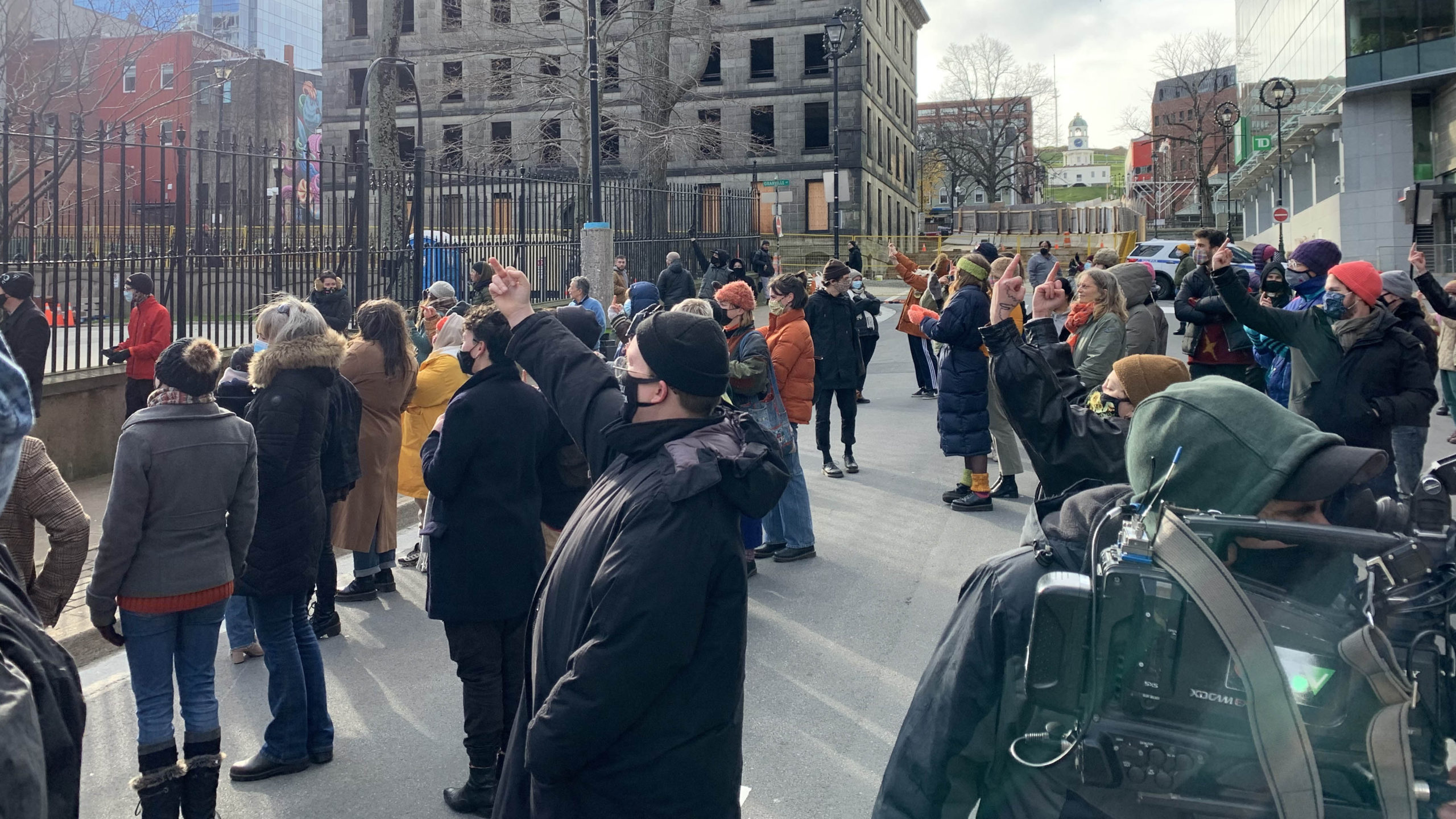
caption
Protesters give the middle finger to Province House on Sunday.John Griffin said he would like to see politicians live in tents to “see how they like it” and know what it’s like to be homeless.
Griffin was at a rally outside Province House in Halifax on Sunday where demonstrators protested the lack of affordable housing in Halifax.
“It is a very rough life. The cold and the pain are excruciating,” Griffin said in an interview after the rally. “I want to see them live in a tent and they’ll see what it’s like, see how they like it.”
Griffin, who is homeless, said he has a lot of anger for politicians, since in his view, they typically don’t do enough.
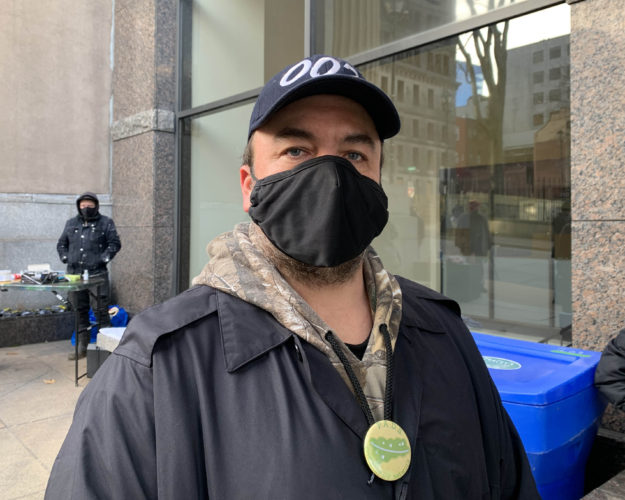
caption
John Griffin lives in the park on the corner of Chebucto Road and Dublin Street in Halifax. He spoke at the rally on Sunday.Rachelle Sauvé spoke enthusiastically to a crowd of over 100 people. She was one of the rally’s organizers and is a member of the Permanent, Accessible, Dignified and Safer Community Network (PADS).
“We want to call back the house,” Sauvé said, referring to the provincial legislature. “We want them to declare this as a human rights crisis, because that’s what it is. We want them to take immediate action. To declare it as a crisis that needs to be addressed.”
They protested the existence of camps of unhoused people who face freezing temperatures as winter approaches. They also decried inaccessibility to housing by marginalized communities like people with disabilities and minimum-wage workers.
The rally comes after the Nova Scotia government announced it would spend over $6.4 million to create 200 units that would rent at $1,200 per month.
Victoria Levack said this is not the right solution.
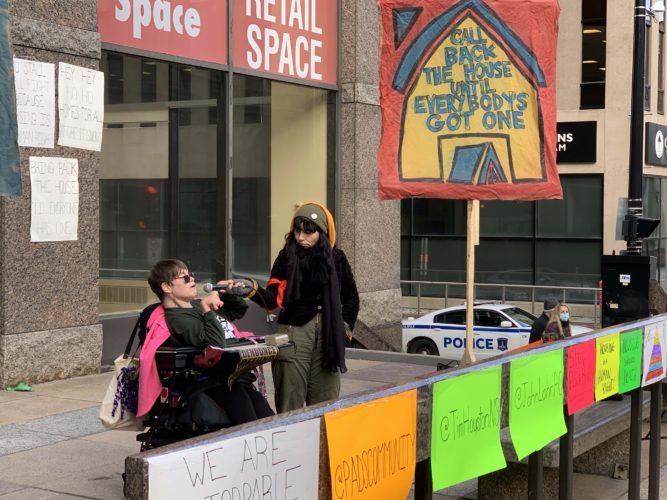
caption
Victoria Levack, official spokesperson for PADS, speaks to the crowd in front of Province House on Sunday.Levack, a spokesperson for PADS, said politicians tend to miss the mark for actual solutions because they don’t know what poverty is like. She said most politicians come from middle class families, and only know how to provide middle class solutions.
“They’re saying what’s affordable is over $1,000 a month. People working minimum wage cannot afford that, so what they think it’s affordable, is not,” Levack said in a phone interview.
Levack said PADS wants the government to treat the housing problem as a humanitarian and immediate crisis, since in her view politicians do not treat it that way.
“If we keep going the way they’re going, it could be 2023, 2024 and 2025, and nothing would be done. When you’re in the middle of a crisis, you don’t just go home for the holidays ’cause you feel like it.”
Adam Faber, a musician who performed at the rally, said politicians were purposely strategic in announcing $6.4 million in spending on National Housing Day.
“Politicians want to serve the middle class,” Faber said in an interview.
Faber said politicians help developers build apartments for the middle class. He said there is no incentive for government to help the poor.
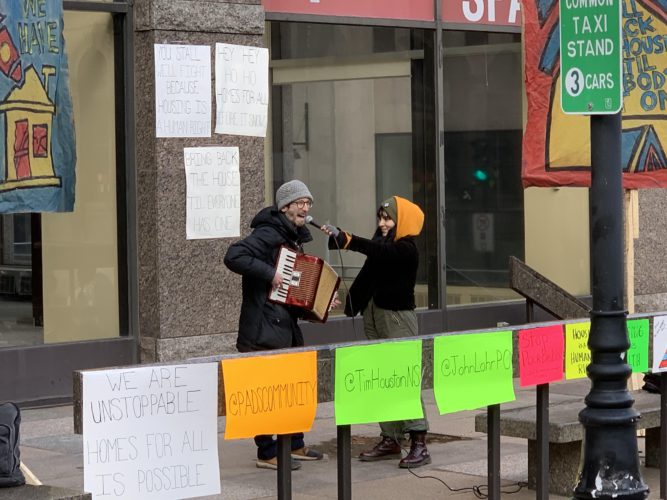
caption
Adam Faber performs several songs in support of affordable housing. Rachelle Sauvé holds the microphone as he sings.But is $1,200 per month affordable?
Jeff Karabanow, a social worker and a professor of social work at Dalhousie University, has studied housing for over 20 years. He has worked with many people in government and independent organizations on affordable housing.
“What they’re proposing is only affordable to a particular sector, a kind of low middle class sector. That’d be the only population that will actually see this as affordable,” Karabanow said.
“For people living in, you know, income-based assistance, or people who are homeless, there will be no benefit to creating this type of affordability,” Karabanow said. “I mean, people who are on disability support, there’s no way, there’s no way you can even tap into that. Rent will be more than what you make.”
The lowest bracket in income-based assistance receives a minimum of $686 per month. For people living under disability assistance, the amount is $950, making rents of $1,200 out of reach.
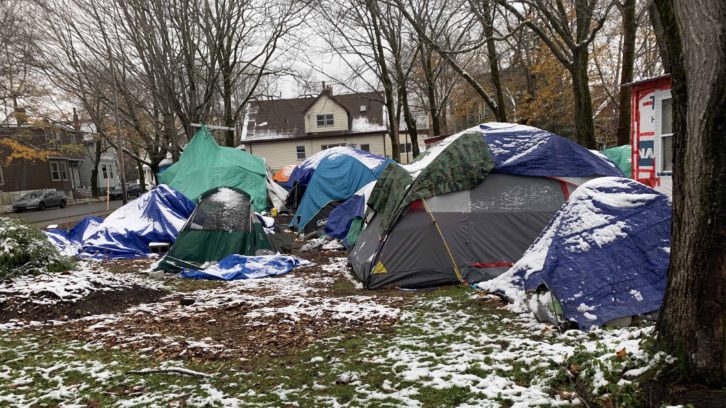
caption
The People’s Park, where John Griffin lives, located on Chebucto Road and Dublin Street, on Nov. 23.Karabanow said investing in housing outside the private sector will end up saving money in the long run, much like it did in Ontario and British Columbia. But the change in affordable housing will not be immediate.
“We have a history of investing in social housing. This is not a new concept that people are articulating at the present,” Karabanow said.
“We evolved as governments, especially social democracies. We have been investing in social housing and there’s been positive outcomes. And in Nova Scotia, we haven’t invested in it properly, because we’ve left it to either the private sector or to community organizations.”
Karabanow said it is significant that the government has been talking about housing for the second year in a row. But, he said last week’s $6.4 million announcement was too late.
“On one hand, probably every level of government is talking about housing. And they’re talking about housing as a social determinant of health, and I think that is very important, but for those that are suffering through this housing crisis right now, it has been too late for a long time.”
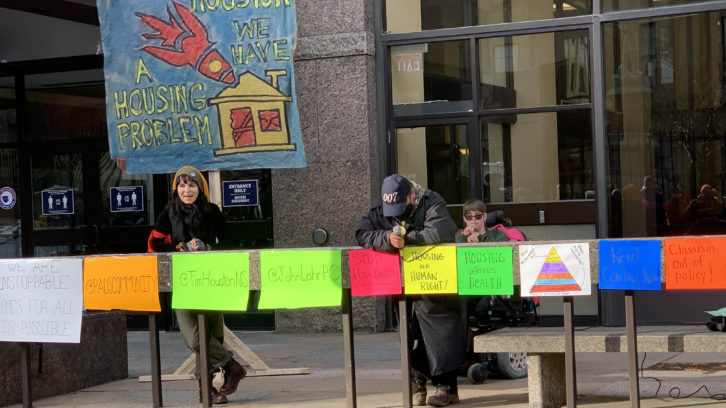
caption
John Griffin cries in the middle of an emotional speech during Sunday’s demonstration.Krista Higdon, spokesperson for Municipal Affairs and Housing, said this was the first provincial announcement on affordable housing, and there will be more.
“The rents listed in the release reflect 20 per cent below the average market rent for those bedroom counts for the respective areas,” Higdon wrote in an email.
Higdon had no comment on whether a $1,200 rent was affordable.
About the author

Abel Rangel
Abel Rangel is a screenwriter and journalist working and living in Halifax, N.S. He earned a master’s degree in transgender studies at New...
